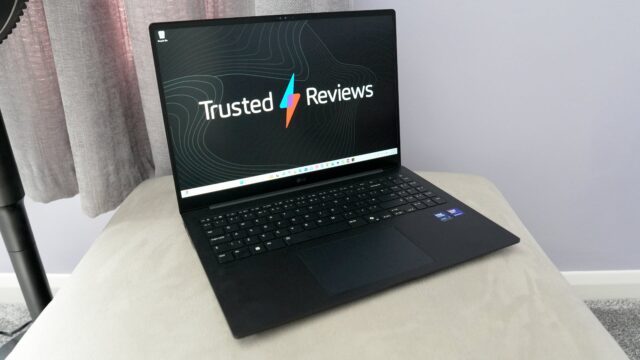Verdict
The LG Gram Pro 16 is an excellent Windows ultrabook thanks to its wonderful portability, solid power and fantastic endurance against key rivals. The high-res IPS screen is good too, as is its wide port selection. Just watch out for its rather high price tag.
-
Immensely lightweight and portable -
Sublime battery life -
Solid port selection
-
Key rivals can offer more power -
Rather expensive
Key Features
-
1.2kg chassis
The Gram Pro 16 features one of the lightest chassis in its size class, making it immensely portable for such a large-screen laptop. -
Intel Core Ultra 7 258V processor
It has one of Intel’s formidable Core Ultra 200V chips inside for solid power and graphical oomph. -
77Whr cell
The Gram Pro 16 has a large battery inside that means it’s able to go the distance over several work days.
Introduction
The LG Gram Pro 16 marks the latest version of LG’s slender and portable powerhouse for 2025.
This particular version adds a new Intel Core Ultra 7 258V processor alongside 32GB of RAM and a 1TB SSD with a 2560×1600 144Hz IPS screen and a formidable port selection in a svelte 1.2kg chassis to sustain LG’s strong reputation for these sublime, portable, large-screened laptops.
All of this comes at a price, though. The Gram Pro 16 carries a hefty £1799.98/$2299.98 price tag, making it one of the pricier options in its class against some recent favourites, including the Asus Zenbook S 16 (2024), Samsung Galaxy Book5 Pro 360, and of course, the Apple MacBook Pro M4.
I’ve been testing the Gram Pro 16 for the last couple of weeks to see if it can come out on top against some quite stiff competition as one of the best ultrabooks we’ve tested. Let’s find out.
Design and Keyboard
- Immensely light and portable
- Solid port selection
- Decent keyboard, but with a shorter travel
The hallmark of LG’s Gram series of laptops has always been their slender and lightweight frame, and that’s been sustained with the Gram Pro 16. It features a featherweight and durable magnesium chassis that easily makes it one of the lightest laptops in its size class at just 1.2kg.
Being so light means this laptop is easily portable in a bag, and I was admittedly surprised at just how light it felt when picking it up for the first time. However, it can lead to some small flexing under pressure. The magnesium frame has a pleasant textured finish in places,

In spite of its svelte 12.8mm thickness, the Gram Pro 16 manages to find room for a decent port selection, with two USB4 Type-C on the left with a full-size HDMI port, while there are a pair of USB-A ports and a headphone jack on the right.
Being a larger laptop has the benefit of providing a full-size keyboard layout, complete with arrow keys, function row and number pad. It’s a functional layout on a keyboard that has a shorter travel distance and snappier feel, although I was left wanting a little more depth at times.


The trackpad is of a decent size, and offers a fair amount of room for your fingers while feeling smooth under finger. Other laptops of this larger size can give you more room, though.
Display and Sound
- Solid IPS screen
- Decent brightness and contrast, plus accurate colours
- Speakers are on the thinner side
The Gram 16 Pro is available in a couple of display variants. Mine has a 16-inch 2560×1600 IPS screen with the benefit of a variable refresh rate up to 144Hz for both excellent detail and smooth motion handling across a larger screen. In a slightly different variation, it is possible to get this laptop with an OLED screen for deeper blacks and more contrast, alongside potentially more accurate colours.
That’s not to say that the IPS panel on this variant is a bad one, because it isn’t. It can get pretty bright with a peak SDR brightness of 419.5 nits, meaning it’s suitable for use both indoors and out if you need to. It has slightly more vertical space with a 16:10 aspect ratio to work well with modern tasks.


Out of the box, the 0.21 black level and 1380:1 contrast ratio are perfectly adequate, giving blacks with good depth and results with a solid dynamic range that largely meets LG’s claims. The 7300K colour temperature pushes a smidgen into bluer tones, but it’s still manageable.
Colours are accurate, with good coverage for both productivity and more colour-sensitive gamuts. There is 100% sRGB, as well as 98% DCI-P3 and 87% Adobe RGB, meaning the Gram 16 Pro could happily be used for more creative tasks, as its ‘Pro’ moniker suggests.


As for its speakers, they’re downwards-firing and typical of most laptop speakers, coming with a fair amount of volume, but little else. They’re on the thinner side, and can sound quite harsh at higher volumes. You’ll be much better off utilising the headphone jack.
Performance
- Solid performance from Intel Core Ultra 7 258V chip
- Excellent integrated graphics
- Good RAM and storage
My sample of the Gram Pro 16 has Intel’s Lunar Lake Core Ultra 7 258V chip inside, the same as a lot of other laptops in this class. It’s a processor with eight cores and threads, and those cores split evenly between Performance and Efficiency types.
This makes it a decently powerful laptop for most tasks, with the processor offering potent single core performance in both the Geekbench 6 and Cinebench R23 tests.
Multi-threaded performance is on par with other laptops with the same processor, although isn’t as strong as with the likes of the M4 MacBook Pro or rivals with AMD’s Ryzen AI 300 chips that still have hyperthreading, so there isn’t just one thread per core of the processor.


Graphical horsepower is strong with the Arc 140V integrated graphics that are demonstrably more powerful than Arm-based Windows laptops with Snapdragon chips inside, as seen with its excellent 3DMark Time Spy score. This makes the Gram Pro 16 a lot more suitable for graphically intensive workloads such as video editing and even some lighter gaming workloads.
My sample has 32GB of fast DDR5 RAM to provide good headroom for those more intensive workloads and extensive multitasking, as well as a decent 1TB SSD that provides good capacity and brisk speeds. The CrystalDiskMark test clocked it to provide reads and writes of 7133.66 MB/s and 6487.43 MB/s, respectively.
Software
- Proper Windows 11 installed
- LG’s own on-board AI tools present
- Usual Copilot+ PC functionality here
The Gram Pro 16 comes running Windows 11, and with a couple of pre-installed LG apps, including its own on-board AI tools.
Two apps are found in the taskbar by default, with MyGram acting as the catch-all system app for fiddling with settings such as the noise-cancelling with the laptop’s microphone. Or choosing different cooling modes. Gram Chat On-Device is essentially another AI chatbot similar to Copilot that can allow you to do things such as ask it where files are that you’ve lost or to summarise a document without needing an internet connection.


As well as having LG’s software, this is a Copilot+ PC, so comes with Microsoft’s usual AI gubbins built into Windows such as generative powers and filters in the Photos and Paint app, as well as the clever Windows Studio webcam effects for background blurring, auto framing and maintaining eye contact.
Battery Life
- Lasted for 21 hours 10 minutes in the battery test
- Capable of lasting for two to three working days
The Gram Pro 16 sustains a more general theme I’ve seen among a lot of laptops so far in 2025 in that the combination of a large battery – 77Whr in this case – and the Intel Core Ultra 7 258V chip results in some immense efficiency.
LG quotes this laptop to last for up to 25 and a half hours on a charge, and my result in the PCMark 10 battery test isn’t too far off. With the brightness at the requisite 150 nits, the Gram Pro 16 lasted for 21 hours and 10 minutes, making it a real efficiency champion.


For such a large-screen laptop, that’s surprisingly excellent, considering rivals such as the Asus Zenbook S 16 (2024) and the MSI Prestige 16 AI Evo (2025) miss out on LG’s crown by a few hours – they lasted for 13 hours 18 minutes and 18 hours 48 minutes respectively.
You’ll easily be able to get through two to three working days before going to plug in, and thanks to the 65W USB-C charger, it’s reasonably brisk at recharging if you’re caught in a pinch. A charge from zero to 50% takes 42 minutes, while a full charge takes 108 minutes. That’s in the right ballpark against comparable laptops.
Should you buy it?
You want a super light large screen laptop
Where the Gram Pro 16 really wins against its rivals is how light and portable it is in spite of a larger screen size. If that’s of top importance, it’s an excellent choice.
You want peak performance
The Gram Pro 16 is no slouch with its Intel Core Ultra 7 258V inside, but rivals with either AMD’s Ryzen AI 300 chips inside or a modern MacBook Pro remain king for absolute peak power.
Final Thoughts
The LG Gram Pro 16 is an excellent Windows ultrabook thanks to its wonderful portability, solid power and fantastic endurance against key rivals. The high-res IPS screen is good too, as is its wide port selection. Just watch out for its rather high price tag.
With this in mind, for a similar price, the Asus Zenbook S 16 (2024) offers more power and a gorgeous frame, as well as an OLED screen, for around the same kind of money, at the expense of less battery life. For more options, check out our list of the best ultrabooks we’ve tested.
How We Test
This LG Gram laptop has been put through a series of uniform checks designed to gauge key factors, including build quality, performance, screen quality and battery life. These include formal synthetic benchmarks and scripted tests, plus a series of real-world checks, such as how well it runs popular apps and how it feels in day-to-day usage over a determined period of time.
FAQs
Yes, the LG Gram 16 Pro has two USB-Cs and two USB-A ports.
Test Data
| LG Gram Pro 16 | |
|---|---|
| PCMark 10 | 7243 |
| UL Procyon photo editing | -4 |
| Cinebench R23 multi core | 9583 |
| Cinebench R23 single core | 1927 |
| Geekbench 6 single core | 2756 |
| Geekbench 6 multi core | 10939 |
| 3DMark Time Spy | 4262 |
| CrystalDiskMark Read speed | 7133.66 MB/s |
| CrystalDiskMark Write Speed | 6487.43 MB/s |
| Brightness (SDR) | 419.5 nits |
| Black level | 0.21 nits |
| Contrast ratio | 1380:1 |
| White Visual Colour Temperature | 7300 K |
| sRGB | 100 % |
| Adobe RGB | 87 % |
| DCI-P3 | 98 % |
| PCMark Battery (office) | 21.2 hrs |
| Battery discharge after 60 minutes of online Netflix playback | 5 % |
| Battery recharge time | 108 mins |
Full Specs
| LG Gram Pro 16 Review | |
|---|---|
| UK RRP | £1799.98 |
| USA RRP | $2299.99 |
| CPU | Intel Core Ultra 7 258V |
| Manufacturer | LG |
| Screen Size | 16 inches |
| Storage Capacity | 1TB |
| Front Camera | 1080p webcam |
| Battery | 77 Whr |
| Battery Hours | 21 10 |
| Size (Dimensions) | 357.7 x 251.6 x 12.9 MM |
| Weight | 1.2 KG |
| Operating System | Windows 11 |
| Release Date | 2025 |
| Resolution | 2560 x 1600 |
| Refresh Rate | 144 Hz |
| Ports | 2x USB4 Type-C, 1x HDMI, 2x USB-A, 1x 3.5mm combo jack |
| Audio (Power output) | 6 W |
| GPU | Intel Arc 140V iGPU |
| RAM | 32GB |
| Connectivity | Wifi 7, Bluetooth 5.4 |
| Display Technology | IPS |
| Screen Technology | IPS |
| Touch Screen | No |
| Convertible? | No |











